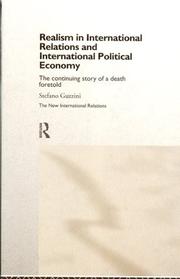| Listing 1 - 10 of 19 | << page >> |
Sort by
|
Book
ISBN: 9780415640466 9780415663045 9780203071748 9781135096571 9781135096618 0203071743 0415640466 Year: 2013 Publisher: London: Routledge,
Abstract | Keywords | Export | Availability | Bookmark
 Loading...
Loading...Choose an application
- Reference Manager
- EndNote
- RefWorks (Direct export to RefWorks)
Framed by a new and substantial introductory chapter, the book collects Stefano Guzzini's reference articles and some less well known publications on power, realism and constructivism. By analysing theories and their assumptions, but also theorists following their intellectual paths, his analysis explores the diversity of different schools and moves beyond simple definitions to explore their intrinsic tensions and fallacies. Guzzini's approach to the analysis of power - both within and outside International Relations - provides the common theme of the book through which the theoretical state of the art in IR is re-assessed.
Power (Social sciences) --- International relations --- Constructivism (Philosophy) --- Realism --- Relations internationales --- Réalisme politique --- Équilibre des puissances --- Grandes puissances --- #SBIB:327.1H10 --- Internationale betrekkingen: theorieën --- Empiricism --- Philosophy --- Universals (Philosophy) --- Conceptualism --- Dualism --- Idealism --- Materialism --- Nominalism --- Positivism --- Rationalism --- Empowerment (Social sciences) --- Political power --- Exchange theory (Sociology) --- Political science --- Social sciences --- Sociology --- Consensus (Social sciences) --- Coexistence --- Foreign affairs --- Foreign policy --- Foreign relations --- Global governance --- Interdependence of nations --- International affairs --- Peaceful coexistence --- World order --- National security --- Sovereignty --- World politics --- Relations internationales. --- Équilibre des puissances. --- Grandes puissances.
Book
ISBN: 9781107027343 9781139225809 9781107676503 9781139779944 113977994X 1139225804 9781139776905 1139776908 9781139782937 1139782932 9781283746502 1283746506 1107676509 1107027349 1139794302 1139889419 1139783823 1139778420 9781139794305 9781139889414 9781139783828 9781139778428 Year: 2012 Volume: 124 Publisher: Cambridge : Cambridge University Press,
Abstract | Keywords | Export | Availability | Bookmark
 Loading...
Loading...Choose an application
- Reference Manager
- EndNote
- RefWorks (Direct export to RefWorks)
The end of the Cold War demonstrated the historical possibility of peaceful change and seemingly showed the superiority of non-realist approaches in International Relations. Yet in the post-Cold War period many European countries have experienced a resurgence of a distinctively realist tradition: geopolitics. Geopolitics is an approach which emphasizes the relationship between politics and power on the one hand; and territory, location and environment on the other. This comparative study shows how the revival of geopolitics came not despite, but because of, the end of the Cold War. Disoriented in their self-understandings and conception of external roles by the events of 1989, many European foreign policy actors used the determinism of geopolitical thought to find their place in world politics quickly. The book develops a constructivist methodology to study causal mechanisms and its comparative approach allows for a broad assessment of some of the fundamental dynamics of European security.
Geopolitics --- History --- Europe --- Foreign relations --- Political science --- International Relations --- General. --- World politics --- Social Sciences --- Political Science --- Geopolitics - Europe - History - 20th century --- Geopolitics - Europe - History - 21st century --- Europe - Foreign relations - 1989 --- -Geopolitics

ISBN: 0415144027 9780415144025 Year: 1998 Publisher: London: Routledge,
Abstract | Keywords | Export | Availability | Bookmark
 Loading...
Loading...Choose an application
- Reference Manager
- EndNote
- RefWorks (Direct export to RefWorks)
Realisme (Filosofie) --- Réalisme --- Réalisme (Philosophie) --- International relations --- Realism --- International relations. --- Realism.
Digital
Year: 2009 Publisher: Copenhagen DIIS
Abstract | Keywords | Export | Availability | Bookmark
 Loading...
Loading...Choose an application
- Reference Manager
- EndNote
- RefWorks (Direct export to RefWorks)
Digital
ISBN: 9788776054151 Year: 2010 Publisher: Copenhagen Danish Institute for International Studies
Abstract | Keywords | Export | Availability | Bookmark
 Loading...
Loading...Choose an application
- Reference Manager
- EndNote
- RefWorks (Direct export to RefWorks)

ISBN: 0415142490 Year: 1998 Publisher: London Routledge
Abstract | Keywords | Export | Availability | Bookmark
 Loading...
Loading...Choose an application
- Reference Manager
- EndNote
- RefWorks (Direct export to RefWorks)
Digital
ISBN: 8776051226 Year: 2005 Publisher: Copenhagen Danish Institute for International Studies
Abstract | Keywords | Export | Availability | Bookmark
 Loading...
Loading...Choose an application
- Reference Manager
- EndNote
- RefWorks (Direct export to RefWorks)
Digital
ISBN: 9788776052430 Year: 2007 Publisher: Copenhagen Danish Institute for International Studies
Abstract | Keywords | Export | Availability | Bookmark
 Loading...
Loading...Choose an application
- Reference Manager
- EndNote
- RefWorks (Direct export to RefWorks)
Digital
ISBN: 9788776052423 Year: 2007 Publisher: Copenhagen Danish Institute for International Studies
Abstract | Keywords | Export | Availability | Bookmark
 Loading...
Loading...Choose an application
- Reference Manager
- EndNote
- RefWorks (Direct export to RefWorks)
Book
Year: 1992 Publisher: Florence European university institute
Abstract | Keywords | Export | Availability | Bookmark
 Loading...
Loading...Choose an application
- Reference Manager
- EndNote
- RefWorks (Direct export to RefWorks)
| Listing 1 - 10 of 19 | << page >> |
Sort by
|

 Search
Search Feedback
Feedback About UniCat
About UniCat  Help
Help News
News